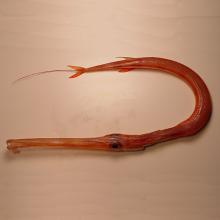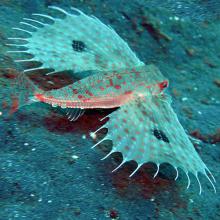Fistularia petimba
Common name:
Red cornetfish
Suborder:
Aulostomoidei
Order:
Syngnathiformes
Class:
Actinopterygii
Dactyloptena orientalis
Common name:
Oriental flying gurnard
Suborder:
Syngnathoidei
Order:
Syngnathiformes
Class:
Actinopterygii
Fistularia petimba
Common name:
Red cornetfish
Suborder:
Aulostomoidei
Order:
Syngnathiformes
Class:
Actinopterygii
Dactyloptena orientalis
Common name:
Oriental flying gurnard
Suborder:
Syngnathoidei
Order:
Syngnathiformes
Class:
Actinopterygii
Fistularia petimba
Common name:
Red cornetfish
Suborder:
Aulostomoidei
Order:
Syngnathiformes
Class:
Actinopterygii
Dactyloptena orientalis
Common name:
Oriental flying gurnard
Suborder:
Syngnathoidei
Order:
Syngnathiformes
Class:
Actinopterygii
Order (Animalia): Syngnathiformes
The Syngnathiformes /ˈsɪŋ(ɡ)nəθɪfɔːrmiːz/ are an order of ray-finned fishes that includes the pipefishes and seahorses.
These fishes have elongated, narrow, bodies surrounded by a series of bony rings, and small, tubular mouths. The shape of their mouth—in at least syngnathids—allows for the ingestion of prey at close range via suction. Several groups of Syngnathiformes live among seaweed and swim with their bodies aligned vertically, to blend in with the stems. The most defining characteristic of this order is their reserve sexual system. In this order, males conduct in specialized brooding and rearing of the embryos. The males house eggs in an osmoregulated pouch or adhere eggs to their tail until the eggs reach maturity.
The name Syngnathiformes means "conjoined-jaws". It is derived from Ancient Greek syn (συν, "together") + gnathos (γνάθος, "jaw"). The ending for fish orders "-formes" is derived from Latin and indicates "of similar form".
Reference: Wikipedia


